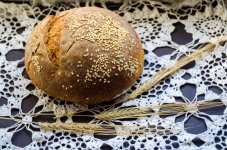kosta_karapinotis
Active member
This is for the ambitious bakers! Add 1 package active dry yeast, 1tsp sugar, 1/4 cup of the whole wheat flour, and 1 cup warm water to a small bowl and mix together well using a whisk. Leave the mixture uncovered and set it aside in a warm place until it has a spongy appearance. You can let the mixture sit for up to 1 1/2 hours, depending on how sour you want the dough to taste. Add 2 cups all-purpose flour, 1 tsp salt to a large bowl and whisk well with a clean, dry whisk. Pour the yeast mixture on top of the dry ingredients and stir well with a wooden spoon. When the dough starts to come together, add all-purpose flour to your work surface and your hands and pour the dough onto it. Knead the dough for 5 minutes, continuing to add small amounts of all-purpose flour until the dough is smooth and no longer sticky.
Wipe the large bowl clean and coat it with oil. Place the dough in the center of the pan and massage the top of the dough with oil. Cover the pan with plastic wrap or a large, clean towel and set aside in a warm place until the dough doubles in size. This should take up to 2 1/2 hours, but it all depends on how warm the environment is. Punch down the dough after it rises and lightly flour the work surface once again. Knead for about 2 minutes, or until the dough is elastic. Spray a baking sheet with nonstick cooking spray. Form the dough into a round loaf shape and place on the baking sheet. Massage the top of the loaf with more olive oil. Set the baking sheet aside until the loaf doubles in size.
The bread should look like this in the end. Serve with olive oil and some cheese, and enjoy!

Wipe the large bowl clean and coat it with oil. Place the dough in the center of the pan and massage the top of the dough with oil. Cover the pan with plastic wrap or a large, clean towel and set aside in a warm place until the dough doubles in size. This should take up to 2 1/2 hours, but it all depends on how warm the environment is. Punch down the dough after it rises and lightly flour the work surface once again. Knead for about 2 minutes, or until the dough is elastic. Spray a baking sheet with nonstick cooking spray. Form the dough into a round loaf shape and place on the baking sheet. Massage the top of the loaf with more olive oil. Set the baking sheet aside until the loaf doubles in size.
The bread should look like this in the end. Serve with olive oil and some cheese, and enjoy!




